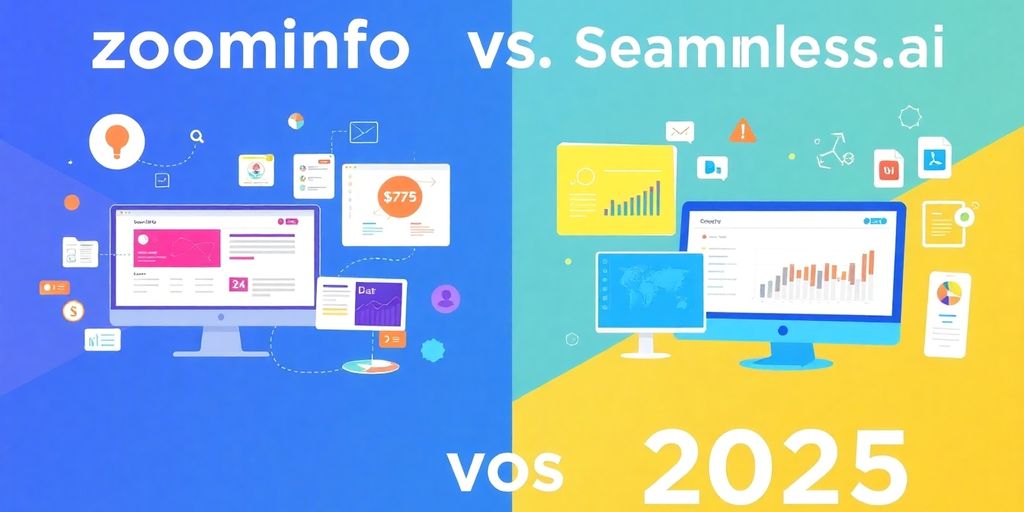Last updated on May 26th, 2025 at 07:11 am
Choosing the right HubSpot compatible AI agent can really change the game for your business. With so many options out there, it’s easy to feel overwhelmed. But don’t worry, this guide will help you understand what these AI agents are, how to evaluate your business needs, and what features to look for. Let’s get started!

Key Takeaways
- Understand the different types of HubSpot compatible AI agents available.
- Identify your business goals to choose the right AI agent features.
- Check the integration capabilities of the AI agent with your existing HubSpot setup.
- Prepare your team for a smooth implementation of the AI agent.
- Measure the success of your AI agent using key performance indicators.
Understanding HubSpot Compatible AI Agents
What Are AI Agents for HubSpot?
Okay, so what exactly are we talking about when we say “AI Agents for HubSpot”? Basically, these are smart little software helpers designed to work inside your HubSpot account. Think of them as digital assistants that can automate tasks, analyze data, and even interact with customers. They use artificial intelligence to make your HubSpot experience more efficient and effective.
Benefits of Using AI Agents
Why bother with AI agents anyway? Well, the benefits can be pretty significant. Here’s a quick rundown:
- Automation: Automate repetitive tasks like data entry, lead scoring, and email follow-ups. This frees up your team to focus on more strategic work.
- Improved Efficiency: AI agents can process information and complete tasks much faster than humans, leading to increased overall efficiency.
- Better Customer Experience: AI-powered chatbots and virtual assistants can provide instant support and personalized interactions, improving customer satisfaction.
- Data-Driven Insights: AI agents can analyze vast amounts of data to identify trends, predict outcomes, and provide actionable insights for better decision-making.
Using AI agents is not about replacing your team, it’s about augmenting their capabilities and making them more productive. It’s about working smarter, not harder.
Types of AI Agents Available
There’s a whole bunch of different AI agents out there, each with its own strengths and weaknesses. Here are a few common types:
- Chatbots: These agents can handle customer inquiries, provide support, and even generate leads through conversations.
- Predictive Analytics Agents: These agents analyze data to predict future outcomes, such as lead conversion rates or customer churn. They can help you connect AI agents to HubSpot securely.
- Content Creation Agents: These agents can assist with content creation tasks, such as writing blog posts, generating social media updates, and even creating email marketing campaigns.
- Task Automation Agents: These agents can automate a wide range of tasks, such as data entry, lead scoring, and workflow management.
Evaluating Your Business Needs

Before you jump into picking an AI agent for HubSpot, it’s really important to take a step back and figure out exactly what your business needs. It’s like trying to find the right tool in a toolbox – you gotta know what you’re trying to fix first, right?
Identifying Key Objectives
What are you hoping to achieve by bringing an AI agent into the mix? Are you trying to boost sales, improve customer service, or streamline internal processes? Having clear objectives is the first step. Think about the specific problems you’re trying to solve. For example:
- Reduce response time to customer inquiries.
- Increase lead generation through automated outreach.
- Improve data accuracy in HubSpot.
Defining these objectives will help you narrow down the type of AI agent that’s right for you. Don’t just chase the shiny new thing; make sure it aligns with your business goals.
Assessing Current Workflows
Take a good, hard look at how your team currently operates. Where are the bottlenecks? What tasks are repetitive and time-consuming? Understanding your existing workflows will highlight areas where an AI agent can make a real difference. Consider mapping out your sales process, customer service interactions, and marketing campaigns. This will help you see where AI agents can slot in and automate tasks. For example, maybe your sales team spends too much time manually entering data into HubSpot. An AI agent could automate that, freeing them up to focus on closing deals.
Determining Required Features
Once you know your objectives and have assessed your workflows, you can start thinking about the specific features you need in an AI agent. Do you need natural language processing (NLP) for understanding customer inquiries? Do you need machine learning capabilities for predicting customer behavior? Do you need it to integrate with other tools besides HubSpot? Make a list of must-have features versus nice-to-have features. Think about things like:
- Integration with HubSpot’s CRM: This is non-negotiable.
- Customizable workflows: Can you tailor the AI agent to your specific business processes?
- Reporting and analytics: Can you track the AI agent’s performance and measure its impact on your business?
Choosing the right features will ensure that the AI agent is a valuable asset to your team. If you’re a [small business bundle], you might have different needs than a large enterprise, so tailor your feature requirements accordingly.
Integration Capabilities with HubSpot
API Access and Compatibility
When you’re thinking about adding an AI agent to your HubSpot setup, one of the first things to check is how well it plays with HubSpot’s API. API access is super important because it’s how the AI agent will talk to HubSpot, pull data, and make changes. If the AI agent’s API isn’t compatible, you’re going to have a bad time. You want to make sure the AI agent can actually use the HubSpot data.
Think of it like this:
- Can the AI agent read data from HubSpot?
- Can it write data back into HubSpot?
- Does it support all the HubSpot objects you need (contacts, deals, etc.)?
Data Synchronization
Data sync is another big deal. You don’t want your AI agent working with old or incomplete information. The AI agent needs to have real-time data synchronization with HubSpot. This means that when something changes in HubSpot, the AI agent knows about it right away, and vice versa.
Here’s why it matters:
- Accuracy: The AI agent makes better decisions when it has the latest data.
- Efficiency: No need to manually update data in multiple places.
- Consistency: Everyone is working off the same information.
Imagine an AI agent trying to personalize emails with outdated contact information. It would be a mess! Data sync keeps everything aligned.
Third-Party Integrations
Finally, consider what other tools your business uses. Does the AI agent play nice with those too? A lot of businesses use a bunch of different apps, and you want to make sure your AI agent can connect to them. Check the HubSpot App Marketplace to see what integrations are available.
Here are some common integrations to think about:
- Email marketing platforms
- Customer support software
- E-commerce platforms
Choosing the Right AI Agent Features
Okay, so you’re thinking about getting an AI agent that works with HubSpot. Cool! But before you jump in, it’s important to think about what you actually need it to do. Not all AI agents are created equal, and picking the right features can make or break your experience. Let’s break down some key areas to consider.
Automation and Task Management
First up: automation. How much of your work do you want this AI to handle? Think about repetitive tasks like data entry, lead scoring, or even scheduling social media posts. A good AI agent should be able to take these off your plate, freeing you up for more important stuff. Consider these points:
- Lead Qualification: Can the AI automatically qualify leads based on pre-set criteria?
- Task Assignment: Can it assign tasks to the right team members based on workload and expertise?
- Workflow Automation: Can it trigger workflows based on specific events or actions?
Customer Interaction Capabilities
Next, think about how the AI will interact with your customers. Will it be handling customer service inquiries? Sending out personalized emails? Or maybe just helping to guide visitors on your website? The AI agent system should be able to communicate effectively and provide a positive customer experience. Here’s what to look for:
- Chatbot Integration: Can it integrate with your website or messaging platforms to provide instant support?
- Personalized Communication: Can it personalize emails and messages based on customer data?
- Sentiment Analysis: Can it analyze customer sentiment to identify potential issues or opportunities?
Analytics and Reporting Tools
Finally, you’ll want to make sure your AI agent comes with solid analytics and reporting tools. After all, what’s the point of automating tasks if you can’t track your progress and measure your results? Look for features that allow you to monitor key performance indicators (KPIs) and identify areas for improvement. You might want to consider:
- Performance Dashboards: Does it offer dashboards that provide a clear overview of key metrics?
- Customizable Reports: Can you create custom reports to track specific goals and objectives?
- Data Visualization: Does it use charts and graphs to help you visualize your data and identify trends?
Choosing the right AI agent features is all about finding the right balance between automation, customer interaction, and analytics. Take the time to assess your business needs and identify the features that will have the biggest impact on your bottom line. Don’t be afraid to experiment and try out different options until you find the perfect fit.
Implementation Strategies for AI Agents
Preparing Your Team
Okay, so you’ve picked out your AI agent. Now what? The first step is getting your team ready. This isn’t just about installing some software; it’s about changing how people work. Start by explaining why you’re bringing in AI. What problems will it solve? How will it make their jobs easier? Transparency is key here. If people feel like AI is being forced on them, they’ll resist it.
- Communicate the benefits clearly.
- Address concerns about job security.
- Involve team members in the selection process (if possible).
Training and Onboarding
Training is super important. Don’t just assume everyone will figure it out. Set up formal training sessions. Create guides. Appoint AI champions within each team who can answer questions and provide support. Make sure the training covers not just how to use the AI, but also how it integrates with existing HubSpot workflows. Think about ongoing training too. AI is always evolving, so your team’s skills need to evolve with it.
It’s better to over-train than under-train. A well-trained team will be more confident and effective in using the AI agent, leading to better results and a smoother transition.
Testing and Feedback Loops
Before you fully roll out the AI agent, test it. Start with a small group of users. Get their feedback. What’s working? What’s not? Use that feedback to make adjustments. Set up a formal feedback loop so people can easily report issues and suggest improvements. This isn’t a one-time thing. Keep testing and gathering feedback even after the full rollout. The goal is to continuously improve the AI’s performance and make sure it’s meeting your business needs. Think of it as an iterative process. You’re not just implementing AI; you’re building a partnership with it.
Measuring Success with AI Agents
It’s not enough to just implement AI agents; you need to know if they’re actually helping your business. Measuring success is all about tracking the right things and making adjustments as needed. Let’s break down how to do that.
Key Performance Indicators
KPIs are your bread and butter for gauging AI agent performance. Think about what you want the AI to achieve and then find metrics that reflect that. For example:
- Task Completion Rate: How often does the AI successfully finish a task?
- Time Savings: How much time is the AI saving your team?
- Cost Reduction: Is the AI helping to lower expenses?
It’s important to set realistic benchmarks. Don’t expect perfection right away. Track your KPIs over time and look for trends. This will give you a clearer picture of the AI’s impact.
Customer Satisfaction Metrics
If your AI agent interacts with customers, you absolutely need to track customer satisfaction. Here are some ways to do that:
- CSAT Scores: Use surveys to ask customers about their experience with the AI.
- Net Promoter Score (NPS): Measure how likely customers are to recommend your business after interacting with the AI.
- Customer Feedback Analysis: Analyze customer reviews and comments to identify areas where the AI is excelling or falling short. For example, you can use AI to analyze financial data to identify patterns.
Continuous Improvement Strategies
AI isn’t a “set it and forget it” solution. You need to constantly refine and improve your AI agents. Here’s how:
- Regular Performance Reviews: Schedule regular reviews of your AI’s performance data.
- A/B Testing: Experiment with different AI configurations to see what works best.
- Feedback Loops: Create a system for gathering feedback from both your team and your customers.
| Metric | Target | Current | Improvement Plan |
|---|---|---|---|
| Task Completion | 90% | 80% | Retrain AI with more data on common failure cases |
| Customer CSAT | 4.5/5 | 4.0/5 | Improve AI’s response to complex queries |
| Time Saved per Task | 15 mins | 10 mins | Optimize AI’s workflow for faster processing |
Future Trends in AI for HubSpot

Emerging Technologies
AI’s journey with HubSpot is just beginning. We’re on the cusp of seeing some pretty cool stuff. Think about AI that can not only answer customer questions but also predict what they’ll need before they even ask. We might see more sophisticated natural language processing, making interactions feel even more human. Also, expect AI to get better at understanding the context of conversations, leading to more relevant and helpful responses. The future is about AI revolution that feels less like interacting with a machine and more like talking to a really helpful, knowledgeable person.
Predictions for AI Development
It’s tough to say exactly where AI will go, but here are some educated guesses:
- Hyper-personalization: AI will analyze tons of data to create experiences tailored to each customer’s unique needs and preferences.
- Smarter Automation: Expect AI to handle more complex tasks, freeing up human agents for the really tricky stuff.
- Improved Integration: AI will work even better with HubSpot’s other tools, creating a more unified and efficient workflow.
The big thing is that AI won’t just be a tool; it’ll be an integral part of how businesses operate within HubSpot. It’s about making things easier, faster, and more effective for everyone involved.
Impact on Business Operations
AI is set to change how businesses use HubSpot in some pretty significant ways. Customer service will become faster and more personalized, marketing campaigns will be more targeted, and sales teams will have better insights into their leads. This means:
- Increased efficiency across departments
- Better customer satisfaction
- More informed decision-making
AI agents are already making waves, and they’re only going to become more important. Businesses that embrace these changes will be the ones that thrive in the years to come. It’s about staying ahead of the curve and using AI agents to their full potential.
Final Thoughts
Choosing the right AI agent for your HubSpot setup doesn’t have to be a headache. Just remember to think about what your business really needs. Look for tools that fit well with your current systems and can grow with you. Don’t rush into a decision; take your time to explore options and read reviews. The right AI can save you time and help your team work smarter, not harder. In the end, it’s all about making your life easier and your customers happier. So, take a step back, weigh your choices, and find the AI agent that feels right for you.
Frequently Asked Questions
What are AI agents for HubSpot?
AI agents are smart tools that help with specific tasks by acting like a human. They can learn from their experiences and make decisions to help businesses run better.
What are the benefits of using AI agents?
Using AI agents can save time, improve customer service, and help businesses work more efficiently. They can handle simple tasks so that employees can focus on more important work.
What types of AI agents can I find for HubSpot?
There are many types of AI agents for HubSpot, including chatbots for customer service, tools for marketing automation, and systems that analyze data.
How do I know which AI agent is right for my business?
To choose the right AI agent, think about your business goals, what tasks you want to automate, and what features you need. It’s important to match the agent’s abilities with your needs.
What should I consider when integrating an AI agent with HubSpot?
Make sure the AI agent can connect with HubSpot easily. Check if it can share data and work with other tools you already use. This will help everything run smoothly.
How can I measure the success of an AI agent?
You can measure success by looking at key performance indicators like customer satisfaction, how quickly tasks are completed, and how much time is saved. Regularly checking these will help you improve over time.







